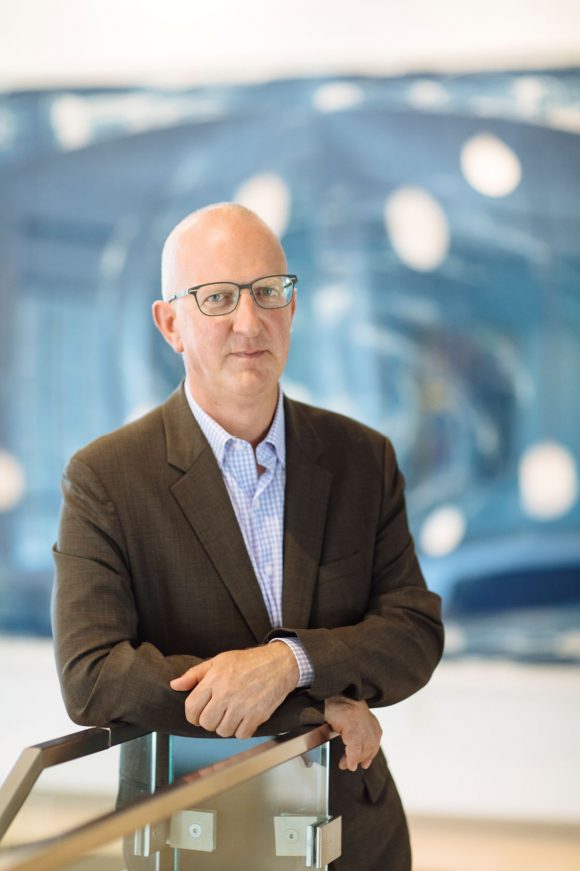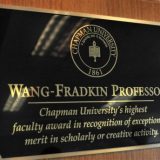Meet the Dean: Michael Ibba, Ph.D. Get to know the new Dean of Schmid College
August 31, 2020
 On July 31, Dr. Michael Ibba began his role as the new dean of Schmid College of Science and Technology.
On July 31, Dr. Michael Ibba began his role as the new dean of Schmid College of Science and Technology.
Dr. Ibba previously was the Chair of the Microbiology Department and served as the Associate Director for the Infectious Disease Institute at The Ohio State University, where he taught for 19 years. He received his Ph.D. in Biochemistry and Applied Molecular Biology from the University of Manchester and came to the United States as an Associate Research Scientist at Yale University.
He has published over 190 research articles and currently holds four research grants. Dr. Ibba has received several awards and distinctions. Notably, in 2019 he received the Distinguished Scholar Award at The Ohio State University and in 2017 and 2020 received the Faculty Award for Diversity Enhancement in the College of Arts and Sciences.
He serves as a member of the National Science Foundation Federal Advisory Committee for Biological Sciences (BIO-AC) and is a fellow of the American Academy of Microbiology and the American Association for the Advancement of Science.
Dr. Ibba shared with us a little bit about his childhood and his passion for research.
Q&A with Dean Ibba:
SC: Where did you grow up?
MI: I was born in London, England, in the same hospital where Alexander Fleming discovered penicillin. I went to school and did my undergraduate degree in London and for me, it’s the greatest city in the world. Whenever I go back I feel like I never left!
SC: What sparked your initial interest in science?
MI: I loved lab classes in high school because they never felt like work to me! I particularly remember my biology and chemistry labs in high school where we got to do things like play with sodium and mercury (I know that dates me!) and grow bugs. When I told my biology teacher I was trying to decide what to study in college, he replied that given how much fun I seemed to be having in his class and the chemistry class I had already decided. So biochemistry it was!SC: What is your current area of research and how did you become passionate about this area?
MI: I’m interested in understanding the mechanisms cells use to ensure the accurate flow of genetic information from genes to proteins. In broad terms, quality control in the genetic supply chain. Recently we have focused on how this can influence the emergence of antibiotic resistance. One of the things our funded work focuses on right now is the molecular arms race between a pathogen and its host, and how that drives antibiotic resistance. I’m learning a lot of new and exciting things, for example how bet hedging and the red queen hypothesis (yes, that red queen from Alice in Wonderland) can drive antibiotic resistance.SC: What’s your favorite thing about being a professor?
MI: The excitement of scientific discovery and sharing this with others as a means of teaching and mentoring. I will never forget when I was a newly-minted assistant professor, we got a really difficult review to deal with for a research paper. I went into the lab and spent two weeks figuring out with my students how to answer the question and instead we discovered a new protein complex. That shared research/learning experience really brought the lab together and the benefits went far beyond just helping us to publish a paper, and really set up the rest of my career.SC: What achievement are you most proud of?
MI: The people I have trained. A few years ago I got to a point in my career when I realized that my most lasting impact in science would be the scientists I had mentored and trained in my lab and that I was very happy about that. Every day I feel very privileged, as I find nothing more rewarding than being able to mentor and train incredible young scientists many of whom have now become friends and colleagues I rely on.SC: What appealed to you about Schmid College and Chapman University, beyond the amazing leadership opportunity?
MI: Beyond all the obvious things, it’s the people. Everywhere I have worked I have got to know some exceptional people and made some life-long friends. I have also encountered plenty of people who seemed less happy with where they worked. When I interviewed here, I came away thinking how much I wanted to contribute to this remarkable community, the likes of which I had never experienced before.SC: What are some of your favorite things to do to relax and recharge?
MI: Anything to do with food and drink– shopping, cooking, eating, dining out. Watching Manchester United and Italy trying to win football (soccer) games. Listening to music, collecting old-fashioned vinyl records. Hiking.SC: What’s the best advice you’ve ever been given?
MI: As a mentor, you can’t change people, instead your role in their success depends on helping them to find out what they’re good at and what they are passionate about. Then you can work together as a team towards realizing both your goals and those of your mentees.SC: What is a fun fact about yourself?
MI: When I was in high school, every day on my way home I crossed Abbey Road at the same place as on the famous Beatles album cover.SC: How do you like your coffee?
MI: In an espresso cup, standing at the counter at a loud coffee bar in Rome.


